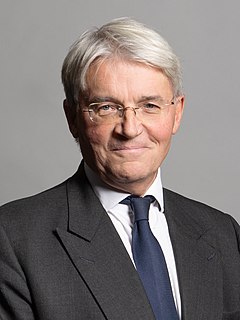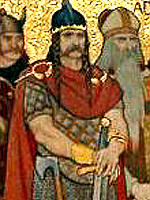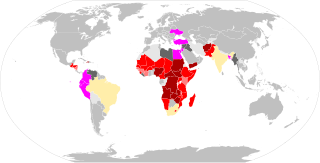
Médecins Sans Frontières, sometimes rendered in English as Doctors Without Borders, is an international humanitarian medical non-governmental organisation (NGO) of French origin best known for its projects in conflict zones and in countries affected by endemic diseases. In 2019, the group was active in 70 countries with over 35,000 personnel mostly local doctors, nurses and other medical professionals, logistical experts, water and sanitation engineers and administrators. Private donors provide about 90% of the organisation's funding, while corporate donations provide the rest, giving MSF an annual budget of approximately US$1.63 billion.
This article contains information about the literary events and publications of 1989.

Andrew John Bower Mitchell is a British politician who has been Member of Parliament (MP) for Sutton Coldfield since 2001. A member of the Conservative Party, he is the son of Sir David Mitchell, who was a Conservative MP for 33 years. Mitchell was also the MP for Gedling from 1987 to 1997. Mitchell served in the Cabinet as Secretary of State for International Development from 2010 to 2012, and then briefly as Government Chief Whip in the House of Commons until he resigned after an alleged altercation with a police officer; referred to as "Plebgate".

Shashi Tharoor is an Indian politician, writer and former international diplomat who has been serving as Member of Parliament, Lok Sabha from Thiruvananthapuram, Kerala, since 2009. He was formerly Under-Secretary General of the United Nations and contested for the post of Secretary-General in 2006.

Kenneth is an English given name and surname. The name is an Anglicised form of two entirely different Gaelic personal names: Cainnech and Cináed. The modern Gaelic form of Cainnech is Coinneach; the name was derived from a byname meaning "handsome", "comely". A short form of Kenneth is Ken or Kenn. A pet form of Kenneth is Kenny.

This is a bibliography for primary sources, books and articles on the personal and general accounts, and the accountabilities, of the 1994 Rwandan genocide.

Robert Stacy McCain is an American conservative journalist, writer, and blogger. McCain is a former assistant national editor and reporter for The Washington Times and co-author of the 2006 book Donkey Cons: Sex, Crime, and Corruption in the Democratic Party. He is proprietor of the blog, The Other McCain.

The Great Lakes refugee crisis is the common name for the situation beginning with the exodus in April 1994 of over two million Rwandans to neighboring countries of the Great Lakes region of Africa in the aftermath of the Rwandan genocide. Many of the refugees were Hutu ethnics fleeing the predominantly Tutsi Rwandan Patriotic Front (RPF), which had gained control of the country at the end of the genocide. However, the humanitarian relief effort was vastly compromised by the presence among the refugees of many of the Interahamwe and government officials who carried out the genocide, who used the refugee camps as bases to launch attacks against the new government led by Paul Kagame. The camps in Zaire became particularly politicized and militarized. The knowledge that humanitarian aid was being diverted to further the aims of the genocidaires led many humanitarian organizations to withdraw their assistance. The conflict escalated until the start of the First Congo War in 1996, when RPF-supported rebels invaded Zaire and sought to repatriate the refugees.
Andrew Thomson is a New Zealand born UN doctor and co-author of the international best seller "Emergency Sex and Other Desperate Measures"

Andrew Michael MacLeod is an Australian/British businessman, author, humanitarian lawyer and former aid worker.

Florence of Arabia is a satirical novel written by Christopher Buckley and first published in 2004 by Random House. The novel follows a fictional State Department employee, Florence Farfaletti, as she attempts to bring equal rights to the fictional Middle Eastern nation of "Matar."
The United Nations Peacekeeping efforts began in 1948. Its first activity was in the Middle East to observe and maintain the ceasefire during the 1948 Arab–Israeli War. Since then, United Nations peacekeepers have taken part in a total of 72 missions around the globe, 14 of which continue today. The peacekeeping force as a whole received the Nobel Peace Prize in 1988.

The Khao-I-Dang (KID) Holding Center was a Cambodian refugee camp 20 km north of Aranyaprathet in Prachinburi. The longest-lived refugee camp on the Thai-Cambodian border, it was established in late 1979, administered by the Thai Interior Ministry and the United Nations High Commissioner for Refugees (UNHCR), unlike other camps on the border, which were administered by a coalition made up of UNICEF, the World Food Program, International Committee of the Red Cross (ICRC) (briefly), and after 1982, the United Nations Border Relief Operation (UNBRO). The camp held refugees fleeing the Cambodian–Vietnamese War.

Shahryar Mohammad Khan is a former career Pakistan diplomat who became Foreign Secretary of Pakistan in 1990, and remained so until his retirement from service in 1994. He later served as United Nations Special Representative of the Secretary-General to Rwanda (1994–1996), and wrote the book Shallow Graves of Rwanda on his experiences on what Rwanda went through. Since August 1999, he has intermittently served as the chairman of Pakistan Cricket Board, and also served as the president of Asian Cricket Council in 2016.
Prostitution in Rwanda is illegal in all aspects. Prostitutes, clients and any involved third parties are criminalised by the country's Penal Code. However, a draft of a new Penal Code that does not prohibit prostitution was presented for debate in the Rwandan Parliament in December 2017.
Prostitution in Cambodia is illegal, but prevalent. A 2008 Cambodian Law on Suppression of Human Trafficking and Sexual Exploitation has proven controversial, with international concerns regarding human rights abuses resulting from it, such as outlined in the 2010 Human Rights Watch report.
Carol Pott is an author and editor who lived in Rwanda during the Rwandan genocide. She writes about the genocide and has published a book titled Genocide in Rwanda: A Collective Memory.
Prostitution in Burundi is illegal but is commonplace and on the rise. Prostitution is prevalent in all areas of the country, and especially in the largest city, Bujumbura, and prior to the security crisis in 2015, the tourist areas around Lake Tanganyika. UNAIDS estimate there are 51,00 prostitutes in Burundi. Many women have turned to prostitution due to poverty.
Linda Polman is a Dutch freelance journalist and author of three books on humanitarian aid and intervention: We Did Nothing, War Games, and The Crisis Caravan.

During the COVID-19 pandemic, food security has been a global concern – in the second quarter of 2020 there were multiple warnings of famine later in the year. According to early predictions, hundreds of thousands of people would likely die and millions more experience hunger without concerted efforts to address issues of food security. As of October 2020, these efforts were reducing the risk of widespread starvation due to the COVID-19 pandemic.










